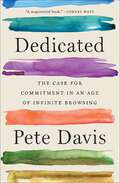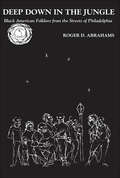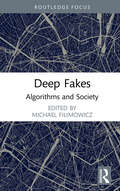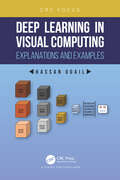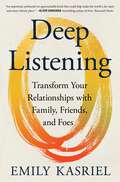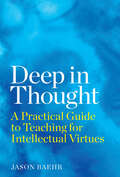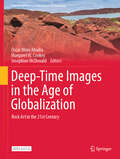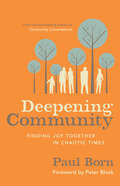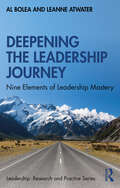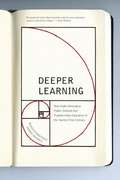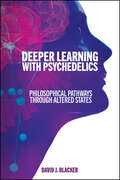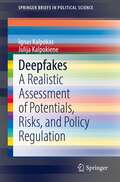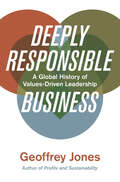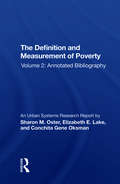- Table View
- List View
Deconstructing ‘Energy Security’ in Oman: A Journey of Securitisation from 1920 to 2020 (Gulf Studies #6)
by Lamya HarubThis book makes a substantial and timely contribution to discussions on energy security in Oman, providing a systematic analysis of energy security in Oman from 1920 to 2020. It is particularly relevant in light of the recent global geopolitics of the Gulf particularly, and the Middle Eastern region broadly, as well as connecting to current climate change research and debates. Combining a political sociological account with postcolonial concepts within a theoretical and empirical exploration of energy politics, the book weaves a study of energy security into the historical and contemporary development of political, economic, security, and social structures in Oman. Including interviews with Omani and Oman-based practitioners, as well as grounded in historical documents which include Arabic-language sources, this book evaluates the energy question beyond the typical economic perspective, considering socio-political opportunities and challenges. It also makes economic-related recommendations in tandem with rentier state theory. Unlike the dominant accounts of energy security in Oman, this book sets itself apart by moving away from utilising liberal and realist approaches for its analysis and engages systematically with critical security studies to introduce a non-Eurocentric perspective to the arena. Of interest to scholars in Middle Eastern history, energy security, and security studies, this book assumes an important place in the critical literature on the Gulf, particularly within environmental studies and energy policy literature.
Deconstruction Machines: Writing in the Age of Cyberwar (Electronic Mediations #54)
by Justin JoqueA bold new theory of cyberwar argues that militarized hacking is best understood as a form of deconstruction From shadowy attempts to steal state secrets to the explosive destruction of Iranian centrifuges, cyberwar has been a vital part of statecraft for nearly thirty years. But although computer-based warfare has been with us for decades, it has changed dramatically since its emergence in the 1990s, and the pace of change is accelerating.In Deconstruction Machines, Justin Joque inquires into the fundamental nature of cyberwar through a detailed investigation of what happens at the crisis points when cybersecurity systems break down and reveal their internal contradictions. He concludes that cyberwar is best envisioned as a series of networks whose constantly shifting connections shape its very possibilities. He ultimately envisions cyberwar as a form of writing, advancing the innovative thesis that cyber attacks should be seen as a militarized form of deconstruction in which computer programs are systems that operate within the broader world of texts. Throughout, Joque addresses hot-button subjects such as technological social control and cyber-resistance entities like Anonymous and Wikileaks while also providing a rich, detailed history of cyberwar. Deconstruction Machines provides a necessary new interpretation of deconstruction and timely analysis of media, war, and technology.
Dedicated: The Case for Commitment in an Age of Infinite Browsing
by Pete DavisA profoundly inspiring and transformative argument that purposeful commitment and civic engagement can be a powerful force in today&’s age of restlessness and indecision.Most of us have had this experience: browsing through countless options on Netflix, unable to commit to watching any given movie—and losing so much time skimming reviews and considering trailers that it&’s too late to watch anything at all. In a book inspired by an idea first articulated in a viral commencement address, Pete Davis argues that this is the defining characteristic of the moment: keeping our options open. We are stuck in &“Infinite Browsing Mode&”—swiping through endless dating profiles without committing to a single partner, jumping from place to place searching for the next big thing, and refusing to make any decision that might close us off from an even better choice we imagine is just around the corner. This culture of restlessness and indecision, Davis argues, is causing tension in the lives of young people today: We want to keep our options open, and yet we yearn for the purpose, community, and depth that can only come from making deep commitments. In Dedicated, Davis examines this quagmire, as well as the counterculture of committers who have made it to the other side. He shares what we can learn from the &“long-haul heroes&” who courageously commit themselves to particular places, professions, and causes—who relinquish the false freedom of an open future in exchange for the deep fulfillment of true dedication. Weaving together examples from history, personal stories, and applied psychology, Davis&’s &“insightful without being preachy…guide to commitment should be on everyone&’s reading list&” (Booklist, starred review).
Deep Down in the Jungle...: Negro Narrative Folklore From The Streets Of Philadelphia
by Roger D. AbrahamsWith the growth of interest in folklore, it becomes increasingly evident that the presentation of a collection needs some rationale more than the fact that traditional materials have been collected and properly annotated. Much has been gathered and is now accessible through journals, archives, and lists. If a corpus of lore is not presented in some way, which bears new light on the process of word-of-mouth transmission, on traditional forms or expressions, or on the group among whom the lore was encountered, there is little reason to present it to the public. This work represents an attempt to present a body of folklore collected among one small group of Black Americans in a neighborhood in South Philadelphia. The author's approach toward collection and presentation has been intensive. He has tried to collect "in depth," and to recreate in his presentation the social background in which the lore was found, and to relate the lore with the life and the values of the group. Abraham's work is a departure from any past methods of analyzing folklore, and therefore a description of the author's point of view and his method will be given first. The majority of this work was written before his methodology was actually formulated. However throughout the project û the object was to illuminate as fully as possible the lore of one small group of African Americans from urban Philadelphia. The methodology, which developed, did so because of this objective more than anything else. Though the formulation of this theory may seem ex post facto, it is included because it clarified much during the rewritings of this book, and more importantly, because it will clarify many matters for the lay reader and for the professional folklorist.
Deep Energy Retrofit—Case Studies: Business and Technical Concepts for Deep Energy Retrofit of Public Buildings; Energy in Buildings and Communities Programme; Annex 61, Subtask A
by Alexander Zhivov Ruediger Lohse Ove C. MørckThis book describes results of research conducted with the goal of providing a framework, selected tools, and guidelines to significantly reduce energy use (by more than 50%) in government and public buildings. The scope of the book is limited to public buildings that were constructed before the 1980s with low internal loads (e.g., office buildings, dormitories, barracks, public housing, and educational buildings) and that were undergoing major renovation. The book contains description and analysis of 26 well-documented case studies from Europe (Austria, Denmark, Estonia, Germany, Ireland, Latvia, Montenegro, The Netherlands, and the UK) and the USA. After these data were collected, the case studies were analyzed with respect to energy use (before and after renovation), reasons for undertaking the renovation, co-benefits achieved, resulting cost-effectiveness, and the business models followed. Finally, “lessons learned” were compiled and compared.Deep Energy Retrofit (DER) is a major building renovation project in which site energy use intensity (including plug loads) has been reduced by at least 50% from the pre-renovation baseline with a corresponding improvement in indoor environmental quality and comfort. Lessons learned from the case studies and experiences of the team clearly indicate that DER can be achieved with the application of “bundles” of a limited number of core technologies readily available on the market. Specific characteristics of some of these core technology bundles generally depend on the technologies available on an individual nation’s market, on the minimum requirements of national standards, and on economics (as determined by a life cycle cost [LCC] analysis).
Deep Fakes: Algorithms and Society (Algorithms and Society)
by Michael FilimowiczDeep Fakes: Algorithms and Society focuses on the use of artificial intelligence technologies to produce fictitious photorealistic audiovisual clips that are indistinguishable from traditional video media.For over a century, the indexical relationship of the photographic image, and its related media of film and video, to the scene of capture has served as a basis for truth claims. Historically, the iconicity of these images has featured a causal traceback to actual light rays in a particular time and space, which were fixed by chemical reactions or digital sensors to the resultant image. Today, photorealistic audiovisual media can be generated from deep learning networks which sever any connection to an actual event. Should society instantiate new regimes to manage this new challenge to our sense of reality and the traditional evidential capacities of the ‘mechanical image?’ How do these images generate information disorder while also providing the basis for legitimate tools used in entertainment and creative industries?Scholars and students from many backgrounds, as well as policy makers, journalists and the general reading public will find a multidisciplinary approach to questions posed by deep fake research from Communication, International Studies, Writing and Rhetoric.
Deep Learning Theory and Applications: 4th International Conference, DeLTA 2023, Rome, Italy, July 13–14, 2023, Proceedings (Communications in Computer and Information Science #1875)
by Ana Fred Oleg Gusikhin Donatello Conte Carlo SansoneThis book consitiutes the refereed proceedings of the 4th International Conference on Deep Learning Theory and Applications, DeLTA 2023, held in Rome, Italy from 13 to 14 July 2023.The 9 full papers and 22 short papers presented were thoroughly reviewed and selected from the 42 qualified submissions. The scope of the conference includes such topics as models and algorithms; machine learning; big data analytics; computer vision applications; and natural language understanding.
Deep Learning and Data Labeling for Medical Applications
by Andrew Bradley Marco Loog João Manuel R. S. Tavares Jaime S. Cardoso Gustavo Carneiro Diana Mateus Loïc Peter Vasileios Belagiannis João Paulo Papa Jacinto C. Nascimento Zhi Lu Julien CornebiseThis book constitutes the refereed proceedings of two workshops held at the 19th International Conference on Medical Image Computing and Computer-Assisted Intervention, MICCAI 2016, in Athens, Greece, in October 2016: the First Workshop on Large-Scale Annotation of Biomedical Data and Expert Label Synthesis, LABELS 2016, and the Second International Workshop on Deep Learning in Medical Image Analysis, DLMIA 2016. The 28 revised regular papers presented in this book were carefully reviewed and selected from a total of 52 submissions. The 7 papers selected for LABELS deal with topics from the following fields: crowd-sourcing methods; active learning; transfer learning; semi-supervised learning; and modeling of label uncertainty. The 21 papers selected for DLMIA span a wide range of topics such as image description; medical imaging-based diagnosis; medical signal-based diagnosis; medical image reconstruction and model selection using deep learning techniques; meta-heuristic techniques for fine-tuning parameter in deep learning-based architectures; and applications based on deep learning techniques.
Deep Learning in Visual Computing: Explanations and Examples
by Hassan UgailDeep learning is an artificially intelligent entity that teaches itself and can be utilized to make predictions. Deep learning mimics the human brain and provides learned solutions addressing many challenging problems in the area of visual computing. From object recognition to image classification for diagnostics, deep learning has shown the power of artificial deep neural networks in solving real world visual computing problems with super-human accuracy. The introduction of deep learning into the field of visual computing has meant to be the death of most of the traditional image processing and computer vision techniques. Today, deep learning is considered to be the most powerful, accurate, efficient and effective method with the potential to solve many of the most challenging problems in visual computing. This book provides an insight into deep machine learning and the challenges in visual computing to tackle the novel method of machine learning. It introduces readers to the world of deep neural network architectures with easy-to-understand explanations. From face recognition to image classification for diagnosis of cancer, the book provides unique examples of solved problems in applied visual computing using deep learning. Interested and enthusiastic readers of modern machine learning methods will find this book easy to follow. They will find it a handy guide for designing and implementing their own projects in the field of visual computing.
Deep Listening: Transform Your Relationships with Family, Friends, and Foes
by Emily Kasriel“If you’ve ever felt like two ears aren’t enough, this book is for you. Deep Listening reveals how we can improve at hearing others—and helping them hear us too.” —Adam Grant, #1 New York Times bestselling author of Think Again and Hidden Potential, and host of the podcast Re:ThinkingWhy do so many conversations leave us feeling unheard and disconnected? In Deep Listening, acclaimed BBC journalist, accredited executive coach, and mediator Emily Kasriel argues that it’s because we've forgotten how to truly listen.Distracted by our own agenda, we so often hear without understanding, impatiently waiting for our turn to speak. In this exploration of transformational listening, Kasriel shows how shifting from surface-level exchanges to Deep Listening can enrich our relationships as friends, parents, and partners, enhance our effectiveness as leaders, and strengthen the fabric of our communities. At a time when divisions within communities, organizations, and families are often a source of profound pain, this book offers inspiration and practical guidance on how we can better listen to each other, even when we fiercely disagree.Drawing on scientific studies, new research, and powerful stories from legendary listeners in politics, business, and the arts, Kasriel unveils her simple yet transformative eight-step approach. With Deep Listening as your guide, you’ll learn to become a better family member, friend, co-worker and citizen.At once a practical guide and a heartfelt manifesto, this groundbreaking book challenges us to rethink our approach to listening and in doing so, transform our lives from the inside out. Whether readers seek to strengthen their empathy, boost their performance at work, or foster genuine understanding across cultural, political, and generational divides, Deep Listening provides the tools and inspiration to unlock the power of lasting, meaningful connections.
Deep Oakland: How Geology Shaped a City
by Andrew AldenA San Francisco Chronicle BestsellerRead the rocks as only a geologist can, with this deep drill-down into Oakland’s geological history and its impacts on the city’s urban present."This book has turned me into a newcomer to my own city, but has also changed the way I will view any landscape. I can think of few greater gifts than that."—Jenny Odell, author of How to Do Nothing"Spending time with Andrew Alden is like giving yourself x-ray eyes." —Roman Mars, host and creator of 99% InvisibleBeneath Oakland’s streets and underfoot of every scurrying creature atop them, rocks roil, shift, crash, and collide in an ever-churning seismological saga. Playing out since time immemorial, the deep geology of this city has chiseled and carved its landforms and the lives of everyone—from the Ohlone to the settlers to the transients and transplants—who has called this singular place home.In Deep Oakland, geologist Andrew Alden excavates the ancient story of Oakland’s geologic underbelly and reveals how its silt, soil, and subterranean sinews are intimately entwined with its human history—and future. Poised atop a world-famous fault line now slumbering, Alden charts how these quaking rocks gave rise to the hills and the flats; how ice-age sand dunes gave root to the city’s eponymous oak forests; how the Jurassic volcanoes of Leona Heights gave way to mining boom times; how Lake Merritt has swelled and disappeared a dozen times over the course of its million-year lifespan; and how each epochal shift has created the terrain cradling Oaklanders today. With Alden as our guide—and with illustrations by Laura Cunningham, author of A State of Change—we see that just as Oakland is a human crossroads, a convergence of cultures from the world over, so too is the bedrock below, carried here from parts still incompletely known.
Deep Secrets: Boys' Friendships and the Crisis of Connection
by Niobe Way“Boys are emotionally illiterate and don’t want intimate friendships.” In this empirically grounded challenge to our stereotypes about boys and men, Niobe Way reveals the intense intimacy among teenage boys especially during early and middle adolescence. Boys not only share their deepest secrets and feelings with their closest male friends, they claim that without them they would go “wacko.” Yet as boys become men, they become distrustful, lose these friendships, and feel isolated and alone. Drawing from hundreds of interviews conducted throughout adolescence with black, Latino, white, and Asian American boys, Deep Secrets reveals the ways in which we have been telling ourselves a false story about boys, friendships, and human nature. Boys’ descriptions of their male friendships sound more like “something out of Love Story than Lord of the Flies.” Yet in late adolescence, boys feel they have to “man up” by becoming stoic and independent. Vulnerable emotions and intimate friendships are for girls and gay men. “No homo” becomes their mantra. These findings are alarming, given what we know about links between friendships and health, and even longevity. Rather than a “boy crisis,” Way argues that boys are experiencing a “crisis of connection” because they live in a culture where human needs and capacities are given a sex (female) and a sexuality (gay), and thus discouraged for those who are neither. Way argues that the solution lies with exposing the inaccuracies of our gender stereotypes and fostering these critical relationships and fundamental human skills.
Deep in Thought: A Practical Guide to Teaching for Intellectual Virtues
by Jason BaehrDeep in Thought provides an introduction to intellectual virtues—the personal qualities and character strengths of good thinkers and learners—and outlines a pragmatic approach for teachers to reinforce them in the classroom.With a combination of theoretical expertise and practical experience, philosopher Jason Baehr endorses intellectual virtues as a rich, meaningful way to think about and understand the purpose of education. He makes a persuasive case for prioritizing intellectual virtues in the classroom to facilitate deeper learning, encourage lifelong learning, and enrich teacher practice.Baehr profiles nine key virtues that enable learners to initiate the process of learning, maintain forward momentum, and overcome common obstacles. With engaging anecdotes and concrete examples, he presents a wealth of principles, postures, and practices that educators can employ in promoting essential habits of mind such as curiosity, open-mindedness, and intellectual courage. Baehr illustrates how opportunities to practice these intellectual habits can be integrated into the classroom in ways that align with current teaching practices. In addition, he shows how educators can adapt these practices to accommodate students&’ identities, developmental abilities, and interests.This thought-provoking book supports all educators, especially middle and high school teachers, in teaching for intellectual virtues. Deep in Thought is a philosophical and yet practical guide to one of the most important aims of education: helping students become skilled thinkers and learners.
Deep-Time Images in the Age of Globalization: Rock Art in the 21st Century (Interdisciplinary Contributions to Archaeology)
by Oscar Moro Abadía Margaret W. Conkey Josephine McDonaldThis open access volume explores the impact of globalization on the contemporary study of deep-time art. The volume explores how early rock art research’s Eurocentric biases have shifted with broadened global horizons to facilitate new conversations and discourses in new post-colonial realities. The book uses seven main themes to explore theoretical, methodological, ethical, and practical developments that are orienting the study of Pleistocene and Holocene arts in the age of globalization. Compiling studies as diverse as genetics, visualization, with the proliferation of increasingly sophisticated archaeological techniques, means that vast quantities of materials and techniques are now incorporated into the analysis of the world’s visual cultures. Deep-Time Images in the Age of Globalization aims to promote critical reflection on the multitude of positive – and negative – impacts that globalization has wrought in rock art research. The volume brings new theoretical frameworks as well as engagement with indigenous knowledge and perspectives from art history. It highlights technical, methodological and interpretive developments, and showcases rock art characteristics from previously unknown (in the global north) geographic areas. This book provides comparative approaches on rock art globally and scrutinises the impacts of globalization on research, preservation, and management of deep-time art. This book will appeal to archaeologists, social scientists and art historians working in the field as well as lovers of rock art.
Deepening Community: Finding Joy Together in Chaotic Times
by Paul BornCommunity shapes our identity, quenches our thirst for belonging, and bolsters our physical, mental, emotional, and economic health. But in the chaos of modern life, community ties have become unraveled, leaving many feeling afraid or alone in the crowd, grasping at shallow substitutes for true community. In this thoughtful and moving book, Paul Born describes the four pillars of deep community: sharing our stories, taking the time to enjoy one another, taking care of one another, and working together for a better world. To show the role each of these plays, he shares his own stories—as a child of refugees and as a longtime community activist. It’s up to us to create community. Born shows that the opportunity is right in front of us if we have the courage and conviction to pursue it.
Deepening the Leadership Journey: Nine Elements of Leadership Mastery (Leadership: Research and Practice)
by Al Bolea Leanne AtwaterDeepening The Leadership Journey is a compendium of topical (and in some cases imponderable) situations for which leadership is either applicable or in need. This new book uses the nine elements in application to five challenges facing the current generation of leaders: making good decisions in an increasingly complex world; motivating and retaining a qualified workforce; equality and a truly diverse and inclusive workplace; cultivating a positive organizational culture; and thriving in a digital world. Intended for personal leadership development and practicing managers as well as courses on leadership, this approachable guide deepens the reader’s leadership journey based on Al Bolea's "J-Curve" model of leadership and the nine essential elements of leadership mastery introduced in Becoming A Leader.
Deeper Learning
by Dennis Mcgrath Monica MartinezStudies suggest that up to half of high school dropouts leave school because their classes are boring or irrelevant to their lives and aspirations. Yet the majority of U.S. schools continue their attempts to engage some 50 million students through conventional methods such as lectures, note-taking, and rote learning, often with dismal results. In Deeper Learning, award-winning education strategist Monica Martinez and education sociologist Dennis McGrath offer a transformative framework for learning that has led to standout results in schools across the country and has the potential to support the development and success of every student.Through examples from eight public schools, the authors chart the path to crafting flexible learning environments that meet the widely varied needs of individual students. They showcase interactive approaches that compel students to learn how to learn and provide an invaluable guide for teachers and communities wondering how their schools will be able to adapt to the Common Core standards and new assessments. Above all, Deeper Learning shows how inspired, engaging education does not have to be the province of elite private schools and how all young people can become creators, collaborators, and critical thinkers.
Deeper Learning with Psychedelics: Philosophical Pathways through Altered States (SUNY series, Horizons in the Philosophy of Education)
by David J. BlackerIn both clinical and informal settings, psychedelics users often report they have undergone something profound and even life-altering. Yet there persists a confounding inability to articulate just what has been imparted. Informed by multidisciplinary emerging research, this book provides an account of the specifically educational aspects of psychedelics and how they can render us ready to learn. Drawing from indigenous peoples worldwide who typically revere these substances as "plant teachers" and from canonical thinkers in the western tradition such as Plato, Spinoza, Kant, and Heidegger, the author proposes an original set of categories through which to understand the educational capabilities of "entheogens" (psychedelics with visionary qualities). It emerges that entheogens' real power lies not in destabilizing and decentering—"turning on and dropping out"—but as powerful aids in restoring and reenchanting our shared worlds.
Deeper Shades of Purple: Womanism in Religion and Society (Religion, Race, and Ethnicity)
by Stacey M. Floyd-ThomasA collection of leading voices on the study of Black women in religious lifeWomanist approaches to the study of religion and society have contributed much to our understanding of Black religious life, activism, and women's liberation. Deeper Shades of Purple explores the achievements of this movement over the past two decades and evaluates some of the leading voices and different perspectives within this burgeoning field.Deeper Shades of Purple brings together a who's who of scholars in the study of Black women and religion who view their scholarship through a womanist critical lens. The contributors revisit Alice Walker's definition of womanism for its viability for the approaches to discourses in religion of Black women scholars. Whereas Walker has defined what it means to be womanist, these contributors define what it means to practice womanism, and illuminate how womanism has been used as a vantage point for the theoretical orientations and methodological approaches of Black women scholar-activists.Contributors: Karen Baker-Fletcher, Katie G. Cannon, M. Shawn Copeland, Kelly Brown Douglas, Carol B. Duncan, Stacey M. Floyd-Thomas, Rachel Elizabeth Harding, Rosemarie Freeney Harding, Melanie L. Harris, Diana L. Hayes, Dwight N. Hopkins, Ada María Isasi-Díaz, Cheryl A. Kirk-Duggan, Kwok Pui-Lan, Daisy L. Machado, Debra Majeed, Anthony B. Pinn, Rosetta Ross, Letty M. Russell, Shani Settles, Dianne M. Stewart, Raedorah Stewart-Dodd, Emilie M. Townes, Traci C. West, and Nancy Lynne Westfield.
Deepfakes: A Realistic Assessment of Potentials, Risks, and Policy Regulation (SpringerBriefs in Political Science)
by Ignas Kalpokas Julija KalpokieneThis book examines the use and potential impact of deepfakes, a type of synthetic computer-generated media, primarily images and videos, capable of both creating artificial representations of non-existent individuals and showing actual individuals doing things they did not do. As such, deepfakes pose an obvious threat of manipulation and, unsurprisingly, have been the subject of a great deal of alarmism in both the news media and academic articles. Hence, this book sets out to critically evaluate potential threats by analyzing human susceptibility to manipulation and using that as a backdrop for a discussion of actual and likely uses of deepfakes. In contrast to the usual threat narrative, this book will put forward a multi-sided picture of deepfakes, exploring their potential and that of adjacent technologies for creative use in domains ranging from film and advertisement to painting. The challenges posed by deepfakes are further evaluated with regard to present or forthcoming legislation and other regulatory measures. Finally, deepfakes are placed within a broader cultural and philosophical context, focusing primarily on posthumanist thought. Therefore, this book is a must-read for researchers, students, and practitioners of political science and other disciplines, interested in a better understanding of deepfakes.
Deeply Responsible Business: A Global History of Values-Driven Leadership
by Geoffrey JonesCorporate social responsibility has entered the mainstream, but what does it take to run a successful purpose-driven business? A Harvard Business School professor examines leaders who put values alongside profits to showcase the challenges and upside of deeply responsible business.For decades, CEOs have been told that their only responsibility is to the bottom line. But consensus is that companies—and their leaders—must engage with their social and environmental contexts. The man behind one of Harvard Business School's most popular courses, Geoffrey Jones distinguishes deep responsibility, which can deliver radical social and ecological responses, from corporate social responsibility, which is often little more than window dressing.Deeply Responsible Business offers an invaluable historical perspective, going back to the Quaker capitalism of George Cadbury and the worker solidarity of Edward Filene. Through a series of in-depth profiles of business leaders and their companies, it carries us from India to Japan and from the turmoil of the nineteenth century to the latest developments in impact investing and the B-corps. Jones profiles business leaders from around the world who combined profits with social purpose to confront inequality, inner-city blight, and ecological degradation, while navigating restrictive laws and authoritarian regimes.He found that these leaders were motivated by bedrock values and sometimes—but not always—driven by faith. They chose to operate in socially productive fields, interacted with humility with stakeholders, and felt a duty to support their communities. While far from perfect—some combined visionary practices with vital flaws—each one showed that profit and purpose could be reconciled. Many of their businesses were highly successful—though financial success was not their only metric of achievement.As companies seek to coopt ethically sensitized consumers, Jones gives us a new perspective to tackle tough questions. Inspired by these passionate and pragmatic business leaders, he envisions a future in which companies and entrepreneurs can play a key role in healing our communities and protecting the natural world.
Deepwater Horizon
by James M. Blossom Earl BoebertIn 2010 BP's Deepwater Horizon catastrophe spiraled into the worst human-made economic and ecological disaster in Gulf Coast history. In the most comprehensive account to date, senior systems engineers Earl Boebert and James Blossom show how corporate and engineering decisions, each one individually innocuous, interacted to create the disaster.
Deer Hunting with Jesus: Dispatches from America's Class War
by Joe BageantA raucous, truth-telling look at the white working poor-and why they hate liberalism.Deer Hunting with Jesus is web columnist Joe Bageant's report on what he learned when he moved back to his hometown of Winchester, Virginia, which-like countless American small towns-is fast becoming the bedrock of a permanent underclass. By turns brutal, tender, incendiary, and seriously funny, this book is a call to arms for fellow progressives with little real understanding of "the great beery, NASCAR-loving, church-going, gun-owning America that has never set foot in a Starbucks."
Def-measuremnt Poverty-2/h
by Sharon M. OsterAre the poor, as one writer suggests, only those without enough to eat? Or does poverty instead consist of "the inability to buy a beer when everyone else has one"? These two volumes provide a comprehensive summary and annotated bibliography of the issues associated with the definition and measurement of poverty. The discussion is organized around eleven topics in the areas of economics, political science, and sociology. Included are such diverse subjects as the historical evolution of poverty definitions (How did Karl Marx and Adam Smith define poverty?); the "index number" problem; and regional differences in poverty measurement. The annotated bibliography, including both articles and books, primarily covers material written after 1950.
Defacing Power: The Aesthetics of Insecurity in Global Politics
by Steele Brent J.Defacing Power investigates how nation-states create self-images in part through aesthetics and how these images can be manipulated to challenge those states' power. Although states have long employed media, such as radio, television, and film, for their own image-making purposes, counterpower agents have also seized upon new telecommunications technologies. Most recently, the Internet has emerged as contested territory where states and other actors wage a battle of words and images. Moving beyond theory, Brent Steele illustrates his provocative argument about the vulnerability of power with examples from recent history: the My Lai Massacre and the Tet Offensive, September 11 and the al-Qaeda communiqués, the atrocities at Fallujah and Abu Ghraib, and the U.S. response to the Asian tsunami of December 2004. He demonstrates how a nation-state---even one as powerful as the United States---comes to feel threatened not only by other nation-states or terrorist organizations but also by unexpected events that challenge its self-constructed image of security. At the same time, Steele shows that as each generation uses available media to create and re-create a national identity, technological innovations allow for the shifting, upheaval, and expansion of the cultural structure of a nation.


